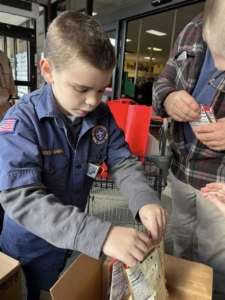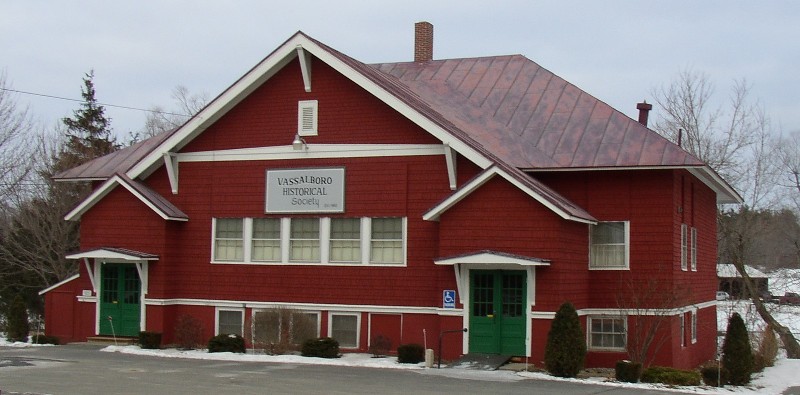Local scouts conduct drive to benefit area food pantries
Text and photos by Chuck Mahaleris

Callum Dorias, of Madison, is a member of Pack #428, in Pittsfield, and took part in the Scouting for Food Drive on November 11. (photo by Chuck Mahaleris)
Lord Robert Baden Powell, the founder of Scouting worldwide, said, “The most worthwhile thing is to try to put happiness into the lives of others.” Scouting isn’t just about earning badges and recognitions. Scouting strives to prepare youth to become responsible, participating citizens and leaders who are guided by the values of Scout Oath and Law. Scout Leaders throughout Kennebec Valley District, try to foster in our Cubs and Scouts an attitude of service especially for those in their community who are struggling. That’s where the annual Scouting for Food Drive comes in.
According to Kennebec Valley District Scouting for Food chairman Shelley Connolly, of Pittsfield, the national food drive began in 1985. Connolly said, “On average, 1 in 4 children in Maine is at risk for hunger daily, and 37 percent of them do not qualify for public assistance. They are even more vulnerable when school is not in session (summers, vacation weeks and weekends). All Scouting Units (Packs, Troops and Crews) are charged with conducting at least one Scouting for Food collection annually.” She stressed this can be done either in the Fall or the Spring depending on when the greatest need exists in their particular community.
“It’s our National Good Turn for America. Fall and Spring collections are recommended.” Scout leaders, working with their local food bank or pantry, pick a date to conduct their food drive. Some choose to go door to door collecting food while in other towns the Scouts fill a tent or a canoe outside a grocery store. Any funds donated to the Scouts at these collection efforts is used to buy additional food for the needy. “Our Scout Oath calls on our young people to “help other people at all times,” and Scouting for Food demonstrates to the nation how our movement can make a difference in their communities,” Connolly said.
Scouts in Vassalboro held their “Scouting for Food” drive on November 19 and collected 142 pounds of food that was delivered to the Vassalboro Food Station Pantry.
“On behalf of all of the families in Troop #497, we would like to thank the Jackman community for your overwhelming support of our annual Scouting for Food Drive,” Scoutmaster Karla Talpey said after the Scouts from the Moose River Valley held their food drive on Saturday, November 18. “We continue to be amazed at the generosity of everyone. We delivered boxes- each filled with a Turkey (or ham), potatoes, stuffing, cranberry sauce, sugar, flour, butter, pasta and pasta sauce, peanut butter and jelly, juice, cereal, turnip, carrots, and yes, even a roll of paper towels- to 12 families. A special Thank you to Mountain Country Market for always allowing us to set up in their parking lot for the day. We would like to wish you all a very happy Thanksgiving.” The troop also received $709 in donations which bought additional food for the needy. “We have been doing this for more than 30 years. The community is so generous.”
Connolly is also the leader for Cubs and Scouts in the Pittsfield area. “Troop and Pack #428 held its annual Scouting for Food event at Danforth’s Downhome Supermarket, in Pittsfield, on November 11,” she said. “Scouts accepted food items from the very generous customers in the community. Additionally, the Scouts set up a Veterans Day display and gave veterans a small gift as they came through. Some customers gave the Scouts a monetary donation for the event. The older Scouts would then take a Cub Scout shopping. It’s always interesting to see what elementary school aged children think would be good in a pantry. They also were able to practice thrifty shopping skills to yield the most amount of items for the amount they had to spend. In the end the Scouts collected just over 900 pounds of food. This food was distributed to three area pantries: Hartland’s Food Cupboard, Somerset Elementary Food Pantry and Warsaw School’s Food Pantry.”
Augusta Troop #631 Scouts and leaders helped pack Thanksgiving food bags on November 19 with the American Legion Post #2. These bags are going to veterans and to the community.














 The 60th annual Waterville Rotary Auction with hundreds of gifts, services and unique items will once again be held online through
The 60th annual Waterville Rotary Auction with hundreds of gifts, services and unique items will once again be held online through 



